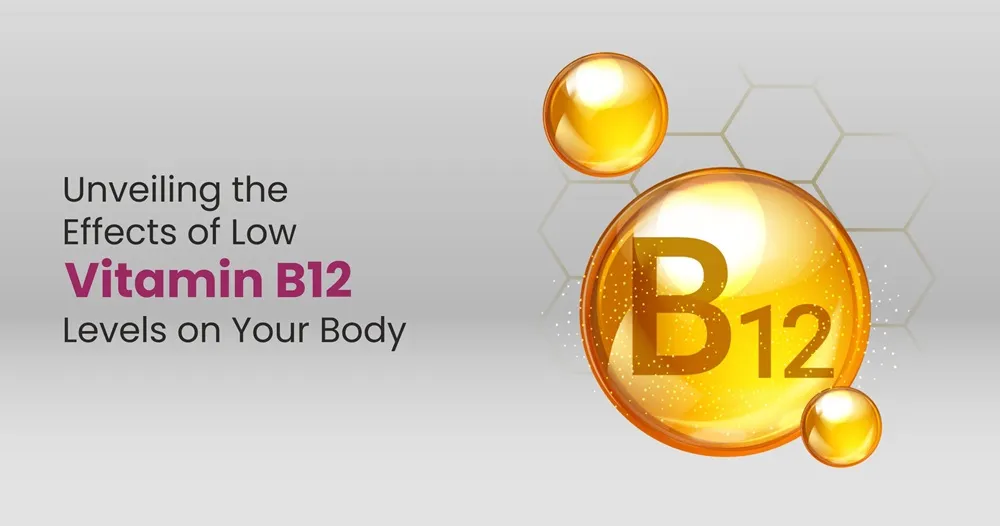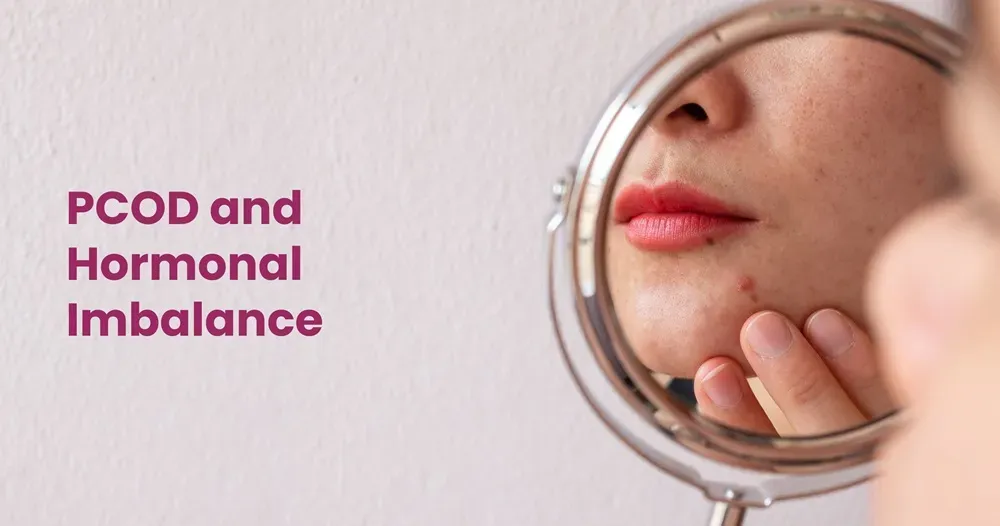Unveiling the Effects of Low Vitamin B12 Levels on Your Body
Mar 23, 2024

Are you feeling tired and dull lately? It might be an indication of low Vitamin B12 levels in your body. Vitamin B12 is a water-soluble vitamin that supports the body's metabolic rate. It is also responsible for the formation of red blood cells, DNA synthesis, and the proper functioning of the nervous system.
Unfortunately, many individuals may suffer from a vitamin B12 deficiency without even realizing it, leading to a host of potentially serious health consequences. But worry not! In this blog, we will find out more about vitamin B12 and what happens if its levels drop within the body. So, you get it checked on time and take the necessary steps suggested by your doctor.
What Happens When the Level of Vitamin B12 Drops?
Since Vitamin B12 is a water-soluble vitamin, it replenishes every day. That means your body cannot store it in abundant quantities. Thus, it is essential to consume Vitamin B12 on a daily basis to maintain the required levels. However, if the levels are not maintained, your body might have to face certain difficulties, such as:
Anaemia
Anaemia is the most common sign of low levels of Vitamin B12. This vitamin plays a major role in the circulation of blood, which means it supports the movement of oxygen inside the body. As soon as the levels of Vitamin B12 drop, the circulation of oxygen in the body decreases. This condition is known as anaemia. Low levels of Vitamin B12 can cause two types of anaemia:
- Megaloblastic Anaemia: In this disease, the size of the red blood corpuscles increases.
- Pernicious Anaemia: This type of anaemia is caused when your body cannot absorb Vitamin B12 inside the body due to an intrinsic factor.
Fatigue
As the body's oxygen levels drop, the production of ATP (Adenosine Triphosphate) also decreases. As a result, these energy packets cannot be made or delivered to all parts of the body. Thus, muscle activity decreases, and people with low levels of Vitamin B12 feel tired.
Nervous System Damage
As mentioned earlier, Vitamin B12 supports the formation of the myelin cells. These cells play a major role in creating a sheet-like structure around the nervous cell. When the level of Vitamin B12 drops, these myelin cells are not formed. Thus, the flow of electric impulses inside the body is slowed down. This can cause loss of sensation or numbness in the extremities of the body. Hence, it leads to severe tingling sensation. Patients often complain of these signs when the body is in a position of rest for a longer time duration.
body. Hence, it leads to severe tingling sensation. Patients often complain of these signs when the body is in a position of rest for a longer time duration.
Loss of Memory
Common signs of extremely low levels of Vitamin B12 include loss of memory or an inability to remember things for a longer period. It is associated with a confused state of mind, where conducting most activities becomes troublesome for the patients. This is usually related to two factors: less oxygen supply to the brain cells and a poor nervous system.
Yellowish Discolouration of Skin
Vitamin B12 helps red blood cells mature. Mature red blood cells help in the red colour of the blood and give the skin a pinkish touch. However, when the maturation of these cells is hampered due to low levels of Vitamin B12, the skin will start appearing pale and yellow.
Elevated Homocysteine Levels
It has been found that as the levels of Vitamin B12 drop, the levels of sulfur increase inside the body. This is directly linked to the rise of homocysteine, an amino acid associated with sulphur. This can cause damage to the DNA or oxidative stress, which can be related to signs of depression.
Improving Your Vitamin B12 Levels
If you are experiencing symptoms of vitamin B12 deficiency, it is important to take steps to improve your levels.
Dietary Sources
Animal-based products like meat, poultry, fish, eggs, and dairy products are naturally rich in vitamin B12. If you follow a vegan or vegetarian diet, you may want to consider fortified foods or supplements to meet your daily vitamin B12 requirements.
Supplementation
Supplementation can be an excellent option if dietary sources alone are not sufficient. There are various forms of vitamin B12 supplements available, including tablets, capsules, and sublingual (under-the-tongue) preparations. It is essential to consult with a healthcare professional to determine the appropriate dosage.
Addressing Underlying Conditions
In addition to dietary changes and supplementation, addressing any underlying conditions that may be affecting your vitamin B12 absorption, such as pernicious anemia or gastrointestinal disorders, can also help improve your levels.
Regular Monitoring
Regular check-ups and monitoring by your healthcare provider can ensure that you maintain optimal vitamin B12 levels for overall health and well-being.
Final Thoughts
Low levels of Vitamin B12 are extremely harmful to the body. They can start as pale skin, dizziness, and numbness. However, when the levels of Vitamin B12 are low in the body in the long term, they can cause severe concerns such as seizures, depression, dementia, etc.
If you have been experiencing any of these signs and symptoms, you must visit the nearest Apollo Diagnostic Center. Getting your levels checked out and taking the right supplements on time can help ensure that your body maintains its Vitamin B12 levels.
FAQs
1. Where is Vitamin B12 absorbed in the body?
Vitamin B12 is primarily absorbed in the terminal ileum, the last portion of the small intestine, with the help of a specific protein called intrinsic factor.
2. How much Vitamin B12 is needed?
According to the RDA, 2.4 mcg of vitamin B12 daily is recommended for both men and women over 14 years old.
3. Why is it needed to have Vitamin B12 regularly?
Vitamin B12 is a water-soluble vitamin that is not stored in the body, so it needs to be replenished regularly through dietary sources or supplements.
4. What is the role of Vitamin B12 inside the body?
It plays a major role in ensuring the smooth functioning of your body's nervous system. It helps the red blood cells mature and the production of myelin within the body. It also plays a role in the DNA synthesis.Unveiling the Effects of Low Vitamin B12 Levels on Your Body
Related Blog Post
Blog Categories
- Child Health
- Mens Health
- Women's Health
- Mental Health
- Health Myths & Facts
- Fitness
- Nutrition/Recipes
- Remedies
- Weight Management
- Stress Management
- Health Supplements
- Addiction Management
- Disease Management
- Allergy
- Anemia
- Arthritis
- Asthma
- Autoimmune Diseases
- Blood Pressure
- Cancer
- Deficiencies
- Dengue/Malaria/Chikungunya
- Diabetes
- Eye Problems
- Heart Diseases
- Hepatitis
- HIV/AIDS/STD
- Hormonal Imbalance
- Infection/Flu/Viral
- Kidney
- Liver
- Menstrual Problems
- Pregnancy
- Skin & Hair Problems
- Stomach Ailments
- Thyroid
- Others
- Health Checkups
- Diagnostics/Pathology
- Lifestyle & Wellness
- Covid
- Medical Tests
- Cholesterol
- Health Tips
- Parent Care/Old Age
- Lungs
- Food Intolerance








